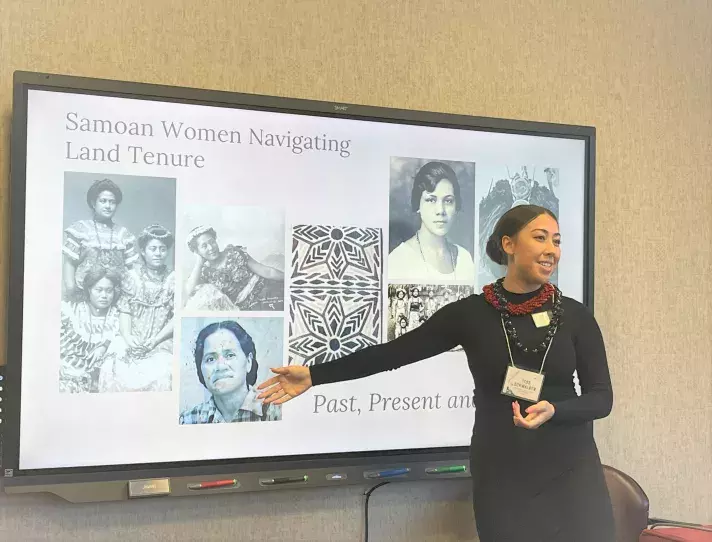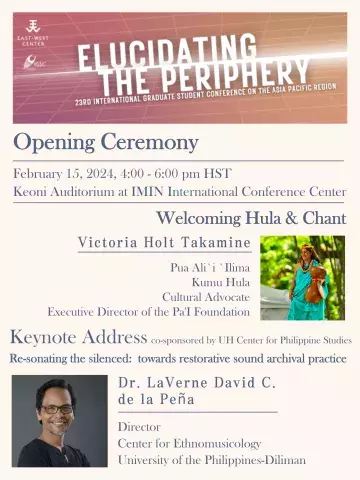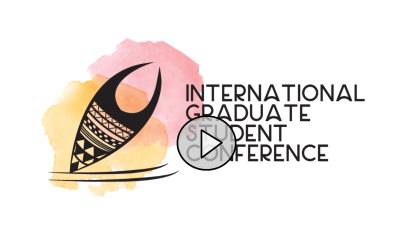
The 23rd East-West Center International Graduate Student Conference
Conference Dates: February 15-17, 2024

Attention all IGSC 2024 Participants!
The conference program is now available digitally! Please CLICK HERE to access the detailed schedule, including workshops, parallel sessions, and to view all papers/poster abstracts to be presented at the 23rd International Graduate Student Conference.
Please use this tentative program as you plan your conference itinerary.
Each year, the East-West Center welcomes graduate students from around the world for the annual International Graduate Student Conference (EWC-IGSC) on the Asia Pacific region. Launched in 2002, this student-run and organized Conference provides an opportunity for scholars to share interdisciplinary perspectives formally, through presenting research papers and attending other panel presentations, and informally in the multi-cultural environment of the East-West Center in Hawai‘i.

Theme: Elucidating the Periphery
Rethinking Neglected Narratives and Novel Approaches
Historic events within this decade compelled scholars, practitioners, and artists to confront neglected issues concerning underrepresented communities and innovative practices - of or on the “periphery.” This conference seeks to highlight work, scholarly and otherwise, that illuminates the periphery. Historically, the periphery was used to describe nations outside of powerful ‘core’ countries, but the periphery is now broadly rearticulated to encompass underrepresented fields, backgrounds, peoples, geographies, and novel methodologies in the humanities, social sciences, arts, and the natural sciences.
As we share research relevant to the Asia-Pacific region, this year’s conference shall provide a space where participants venture beyond their own boundaries to interface with neglected narratives from peripheral perspectives as well as novel techniques in a transdisciplinary context. We invite scholars, practitioners, artists, and scientists whose work highlights issues, communities, or practices that broadly concern the periphery.
We encourage student scholars, artists, scientists, and practitioners to identify their work in one of these interrelated streams of the conference. We recognize that these streams are not exclusive and are all work interdependently, but for the purposes of this conference, we ask that presenters choose a primary stream that their presentation is focused on. Note that the questions and issues within each stream are non-exhaustive and serve as suggestions and insights:
- Social, Political, and Humanitarian Crises: How do institutions and states in Asia and the Pacific (inter)act to address ideological fissures and polarization of modern-day politics from local to global levels? What efforts are made to help those caught in the intersections of various crises? What kind of agencies are enacted and formulated to counter unfreedoms many populations face? In what ways do the legacies of imperialism, colonialism, and patriarchy manifest and contribute to current crises and renewed forms of marginalization?
- Ecological Dangers and Environmental Hazards: How do climate change and natural disasters such as earthquakes, tsunamis, volcanic eruptions, and rising sea level among others affect those in the periphery, especially in Asia and the Pacific that hosts more than half of the global population? What are the broader impacts of novel or underrepresented approaches that address these dangers and hazards? How can one navigate the intensifying hazards faced by communities in the Pacific and Asia as regions uniquely vulnerable to these environmental risks? How might one elucidate the insights of overlooked or underrepresented perspectives and indigenous knowledge in mitigating these environmental hazards and their impacts? What kind of challenges do governments and communities now face with these looming threats of sea level rise and natural disasters? What efforts and new approaches in both scientific and social fields are made to address and identify these kinds of dangers?
- Dilemmas in Economies and Labor: How do current government spending, investment, production and consumption practices shape our ways of living and engender all kinds of inequities? In what ways do various stakeholders—from individual consumers, organizations, the state, to corporations—cope with or address issues of inflation, economic (de)growth, unemployment, distribution, economic insecurity (notably food and housing) among others? How are labor practices and the movement of labor affected and reimagined amid these various crises surrounding the pandemic and legacies of colonialism?
- Crises in Public Health and Disability: How did the recent pandemic illuminate problems surrounding public health especially in the periphery and marginalized populations relating to Asia and the Pacific? What new and long-known challenges on disability have been elucidated by the pandemic and other recent crises? What efforts have been enacted to support or endanger the public health systems of various communities? What challenges did various public health practitioners and administrators face in the context of disparate inequities during the pandemic and beyond?
- Peripheral Cultures, Languages, Subjectivities, and Aesthetics: How do various crises affect our ways of living, expression, languages, and the formation of identity from local to global levels? What role do Asian and Pacific artists, performers, musicians, writers, among others play in articulating the experiences in the periphery? How do deep-seated beliefs and cultures mold (inter)actions and communications within, between, and among communities? What efforts are made to revitalize endangered and underrepresented cultures, languages, techniques, and practices?
- (Re)writing Past and Present Narratives in the Advent of New Technology: With Asia’s large cyberspace and recent trends in national elections in the region, how do social media, the Internet, and ways of distributing information, especially across archipelagic regions, help in changing the terrain of the political arena both in advocating for and further marginalizing peripheral communities and peoples? How do, or how will, artificial intelligence, surveillance, and various media affect daily life? How does the internet influence communication across a region separated by geographic barriers such as mountain ranges and bodies of water?
- Resurgent Epistemologies and Revitalizing Othered Ontologies: What ways of knowing (epistemologies) and ways of being (ontologies) in Asia and the Pacific have been marginalized by current dominant systems and paradigms? What kind of efforts are made to revitalize and to bring about the resurgence of these practices?
For any inquiries or questions regarding the conference, please connect with us at [email protected]
Logistical Information (FAQs)
The IGSC Frequently Asked Questions pages contain comprehensive information regarding the conference, including abstract submission, registration and fees, and guidelines for presenters.
Conference Venue and Accommodation
The conference is scheduled to be held at the Hawaiʻi Imin International Conference Center, at 1777 East-West Road, Honolulu, HI 96848, which adjoins the University of Hawai‘i at Mānoa campus and the East-West Center residence halls. Refer to the Imin Conference Center website for more information.
A limited number of rooms at the East-West Center residence halls are reserved for registered conference participants. Special rates will be made available for conference participants but will be applicable only for the conference dates. (However, once you check out, the special rates will not be applicable if you check in again during the specified period). Make sure that you mention the International Graduate Student Conference when you reserve a room.
The rates per night for the conference participants are as follows:
Lincoln Hall
- Studio room - $70/night
- Corner Studio room - $88/night
- 1 bedroom w/kitchen room - $105/night
Hale Mānoa Dormitory
$29/night
Rent is due upon check in.
Please refer to the EWC Housing website for details (including pictures of the rooms) and reservation procedure.
Participants are requested to get in touch with EWC Housing authorities directly for their accommodation reservation as well as questions thereto by email at: [email protected]. Please wait until you are notified about the results of abstract selection committee before making a reservation.
We look forward to welcoming you to the East-West Center. In preparation of your arrival, please visit our East-West Center Participant Information webpage where you can find useful tips for your stay here.
U.S. Visa Information
Non-US participants who need a B-1 visa to enter the United States are encouraged to start looking for information related to obtaining a US visa in your country. The following websites may be useful for you:
US Embassies
- for embassy location, policies, and procedures for visa applications/issuance
Visa Appointments & Waiting Times
- for wait times for required visa appointments/issuance by consular post
Visa Waiver Program
- for countries participating in a visa waiver program with the United States
Please note that the EWC does not provide visa assistance. However, the abstract acceptance email for the conference serves as a valid document for you to initiate your visa process.
Past Conferences
For additional information, as well as photos, please refer to the web pages for past conferences, available in the right-hand menu. Also see the video below:

Contact Information
The International Graduate Student Conference
c/o EWC Education Program
1601 East-West Road, Burns Hall 2089
Honolulu, Hawai‘i 96848
USA
Ph. (808) 944-7458
Fax (808) 944-7070
Email: [email protected]
Travel notice:
The East-West Center is committed to following travel guidelines set out by the CDC regarding the coronavirus.
The 23rd East-West Center International Graduate Student Conference
Conference Dates: February 15-17, 2024

Attention all IGSC 2024 Participants!
The conference program is now available digitally! Please CLICK HERE to access the detailed schedule, including workshops, parallel sessions, and to view all papers/poster abstracts to be presented at the 23rd International Graduate Student Conference.
Please use this tentative program as you plan your conference itinerary.
Each year, the East-West Center welcomes graduate students from around the world for the annual International Graduate Student Conference (EWC-IGSC) on the Asia Pacific region. Launched in 2002, this student-run and organized Conference provides an opportunity for scholars to share interdisciplinary perspectives formally, through presenting research papers and attending other panel presentations, and informally in the multi-cultural environment of the East-West Center in Hawai‘i.

Theme: Elucidating the Periphery
Rethinking Neglected Narratives and Novel Approaches
Historic events within this decade compelled scholars, practitioners, and artists to confront neglected issues concerning underrepresented communities and innovative practices - of or on the “periphery.” This conference seeks to highlight work, scholarly and otherwise, that illuminates the periphery. Historically, the periphery was used to describe nations outside of powerful ‘core’ countries, but the periphery is now broadly rearticulated to encompass underrepresented fields, backgrounds, peoples, geographies, and novel methodologies in the humanities, social sciences, arts, and the natural sciences.
As we share research relevant to the Asia-Pacific region, this year’s conference shall provide a space where participants venture beyond their own boundaries to interface with neglected narratives from peripheral perspectives as well as novel techniques in a transdisciplinary context. We invite scholars, practitioners, artists, and scientists whose work highlights issues, communities, or practices that broadly concern the periphery.
We encourage student scholars, artists, scientists, and practitioners to identify their work in one of these interrelated streams of the conference. We recognize that these streams are not exclusive and are all work interdependently, but for the purposes of this conference, we ask that presenters choose a primary stream that their presentation is focused on. Note that the questions and issues within each stream are non-exhaustive and serve as suggestions and insights:
- Social, Political, and Humanitarian Crises: How do institutions and states in Asia and the Pacific (inter)act to address ideological fissures and polarization of modern-day politics from local to global levels? What efforts are made to help those caught in the intersections of various crises? What kind of agencies are enacted and formulated to counter unfreedoms many populations face? In what ways do the legacies of imperialism, colonialism, and patriarchy manifest and contribute to current crises and renewed forms of marginalization?
- Ecological Dangers and Environmental Hazards: How do climate change and natural disasters such as earthquakes, tsunamis, volcanic eruptions, and rising sea level among others affect those in the periphery, especially in Asia and the Pacific that hosts more than half of the global population? What are the broader impacts of novel or underrepresented approaches that address these dangers and hazards? How can one navigate the intensifying hazards faced by communities in the Pacific and Asia as regions uniquely vulnerable to these environmental risks? How might one elucidate the insights of overlooked or underrepresented perspectives and indigenous knowledge in mitigating these environmental hazards and their impacts? What kind of challenges do governments and communities now face with these looming threats of sea level rise and natural disasters? What efforts and new approaches in both scientific and social fields are made to address and identify these kinds of dangers?
- Dilemmas in Economies and Labor: How do current government spending, investment, production and consumption practices shape our ways of living and engender all kinds of inequities? In what ways do various stakeholders—from individual consumers, organizations, the state, to corporations—cope with or address issues of inflation, economic (de)growth, unemployment, distribution, economic insecurity (notably food and housing) among others? How are labor practices and the movement of labor affected and reimagined amid these various crises surrounding the pandemic and legacies of colonialism?
- Crises in Public Health and Disability: How did the recent pandemic illuminate problems surrounding public health especially in the periphery and marginalized populations relating to Asia and the Pacific? What new and long-known challenges on disability have been elucidated by the pandemic and other recent crises? What efforts have been enacted to support or endanger the public health systems of various communities? What challenges did various public health practitioners and administrators face in the context of disparate inequities during the pandemic and beyond?
- Peripheral Cultures, Languages, Subjectivities, and Aesthetics: How do various crises affect our ways of living, expression, languages, and the formation of identity from local to global levels? What role do Asian and Pacific artists, performers, musicians, writers, among others play in articulating the experiences in the periphery? How do deep-seated beliefs and cultures mold (inter)actions and communications within, between, and among communities? What efforts are made to revitalize endangered and underrepresented cultures, languages, techniques, and practices?
- (Re)writing Past and Present Narratives in the Advent of New Technology: With Asia’s large cyberspace and recent trends in national elections in the region, how do social media, the Internet, and ways of distributing information, especially across archipelagic regions, help in changing the terrain of the political arena both in advocating for and further marginalizing peripheral communities and peoples? How do, or how will, artificial intelligence, surveillance, and various media affect daily life? How does the internet influence communication across a region separated by geographic barriers such as mountain ranges and bodies of water?
- Resurgent Epistemologies and Revitalizing Othered Ontologies: What ways of knowing (epistemologies) and ways of being (ontologies) in Asia and the Pacific have been marginalized by current dominant systems and paradigms? What kind of efforts are made to revitalize and to bring about the resurgence of these practices?
For any inquiries or questions regarding the conference, please connect with us at [email protected]
Logistical Information (FAQs)
The IGSC Frequently Asked Questions pages contain comprehensive information regarding the conference, including abstract submission, registration and fees, and guidelines for presenters.
Conference Venue and Accommodation
The conference is scheduled to be held at the Hawaiʻi Imin International Conference Center, at 1777 East-West Road, Honolulu, HI 96848, which adjoins the University of Hawai‘i at Mānoa campus and the East-West Center residence halls. Refer to the Imin Conference Center website for more information.
A limited number of rooms at the East-West Center residence halls are reserved for registered conference participants. Special rates will be made available for conference participants but will be applicable only for the conference dates. (However, once you check out, the special rates will not be applicable if you check in again during the specified period). Make sure that you mention the International Graduate Student Conference when you reserve a room.
The rates per night for the conference participants are as follows:
Lincoln Hall
- Studio room - $70/night
- Corner Studio room - $88/night
- 1 bedroom w/kitchen room - $105/night
Hale Mānoa Dormitory
$29/night
Rent is due upon check in.
Please refer to the EWC Housing website for details (including pictures of the rooms) and reservation procedure.
Participants are requested to get in touch with EWC Housing authorities directly for their accommodation reservation as well as questions thereto by email at: [email protected]. Please wait until you are notified about the results of abstract selection committee before making a reservation.
We look forward to welcoming you to the East-West Center. In preparation of your arrival, please visit our East-West Center Participant Information webpage where you can find useful tips for your stay here.
U.S. Visa Information
Non-US participants who need a B-1 visa to enter the United States are encouraged to start looking for information related to obtaining a US visa in your country. The following websites may be useful for you:
US Embassies
- for embassy location, policies, and procedures for visa applications/issuance
Visa Appointments & Waiting Times
- for wait times for required visa appointments/issuance by consular post
Visa Waiver Program
- for countries participating in a visa waiver program with the United States
Please note that the EWC does not provide visa assistance. However, the abstract acceptance email for the conference serves as a valid document for you to initiate your visa process.
Past Conferences
For additional information, as well as photos, please refer to the web pages for past conferences, available in the right-hand menu. Also see the video below:

Contact Information
The International Graduate Student Conference
c/o EWC Education Program
1601 East-West Road, Burns Hall 2089
Honolulu, Hawai‘i 96848
USA
Ph. (808) 944-7458
Fax (808) 944-7070
Email: [email protected]
Travel notice:
The East-West Center is committed to following travel guidelines set out by the CDC regarding the coronavirus.

